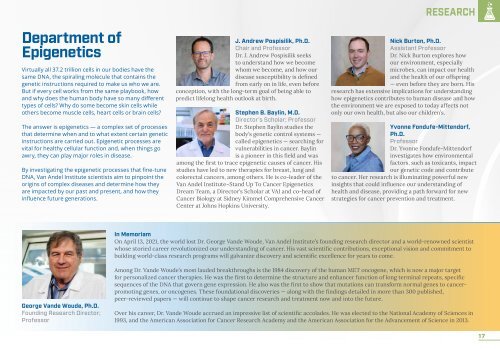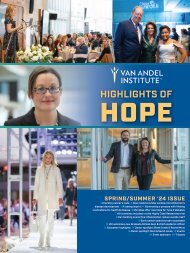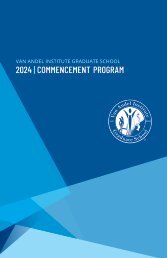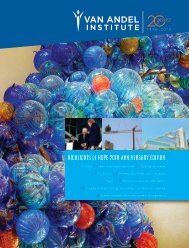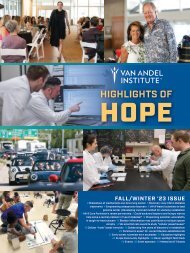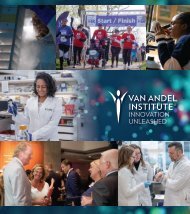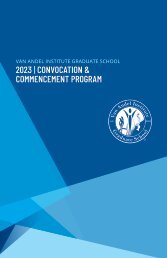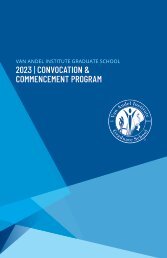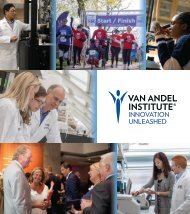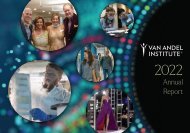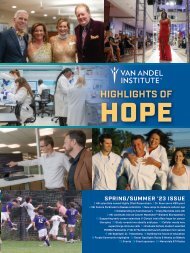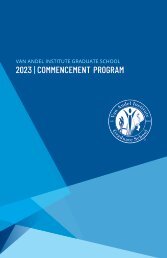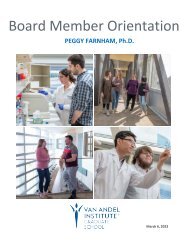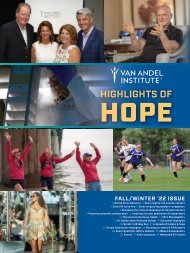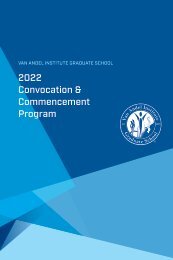2021 Annual Report
This is the 2021 Annual Report for Van Andel Institute.
This is the 2021 Annual Report for Van Andel Institute.
You also want an ePaper? Increase the reach of your titles
YUMPU automatically turns print PDFs into web optimized ePapers that Google loves.
Department of<br />
Epigenetics<br />
Virtually all 37.2 trillion cells in our bodies have the<br />
same DNA, the spiraling molecule that contains the<br />
genetic instructions required to make us who we are.<br />
But if every cell works from the same playbook, how<br />
and why does the human body have so many different<br />
types of cells? Why do some become skin cells while<br />
others become muscle cells, heart cells or brain cells?<br />
The answer is epigenetics — a complex set of processes<br />
that determine when and to what extent certain genetic<br />
instructions are carried out. Epigenetic processes are<br />
vital for healthy cellular function and, when things go<br />
awry, they can play major roles in disease.<br />
By investigating the epigenetic processes that fine-tune<br />
DNA, Van Andel Institute scientists aim to pinpoint the<br />
origins of complex diseases and determine how they<br />
are impacted by our past and present, and how they<br />
influence future generations.<br />
J. Andrew Pospisilik, Ph.D.<br />
Chair and Professor<br />
Dr. J. Andrew Pospisilik seeks<br />
to understand how we become<br />
whom we become, and how our<br />
disease susceptibility is defined<br />
from early on in life, even before<br />
conception, with the long-term goal of being able to<br />
predict lifelong health outlook at birth.<br />
Stephen B. Baylin, M.D.<br />
Director’s Scholar; Professor<br />
Dr. Stephen Baylin studies the<br />
body’s genetic control systems —<br />
called epigenetics — searching for<br />
vulnerabilities in cancer. Baylin<br />
is a pioneer in this field and was<br />
among the first to trace epigenetic causes of cancer. His<br />
studies have led to new therapies for breast, lung and<br />
colorectal cancers, among others. He is co-leader of the<br />
Van Andel Institute–Stand Up To Cancer Epigenetics<br />
Dream Team, a Director’s Scholar at VAI and co-head of<br />
Cancer Biology at Sidney Kimmel Comprehensive Cancer<br />
Center at Johns Hopkins University.<br />
RESEARCH<br />
Nick Burton, Ph.D.<br />
Assistant Professor<br />
Dr. Nick Burton explores how<br />
our environment, especially<br />
microbes, can impact our health<br />
and the health of our offspring<br />
— even before they are born. His<br />
research has extensive implications for understanding<br />
how epigenetics contributes to human disease and how<br />
the environment we are exposed to today affects not<br />
only our own health, but also our children’s.<br />
Yvonne Fondufe-Mittendorf,<br />
Ph.D.<br />
Professor<br />
Dr. Yvonne Fondufe-Mittendorf<br />
investigates how environmental<br />
factors, such as toxicants, impact<br />
our genetic code and contribute<br />
to cancer. Her research is illuminating powerful new<br />
insights that could influence our understanding of<br />
health and disease, providing a path forward for new<br />
strategies for cancer prevention and treatment.<br />
In Memoriam<br />
On April 13, <strong>2021</strong>, the world lost Dr. George Vande Woude, Van Andel Institute’s founding research director and a world-renowned scientist<br />
whose storied career revolutionized our understanding of cancer. His vast scientific contributions, exceptional vision and commitment to<br />
building world-class research programs will galvanize discovery and scientific excellence for years to come.<br />
George Vande Woude, Ph.D.<br />
Founding Research Director;<br />
Professor<br />
Among Dr. Vande Woude’s most lauded breakthroughs is the 1984 discovery of the human MET oncogene, which is now a major target<br />
for personalized cancer therapies. He was the first to determine the structure and enhancer function of long terminal repeats, specific<br />
sequences of the DNA that govern gene expression. He also was the first to show that mutations can transform normal genes to cancerpromoting<br />
genes, or oncogenes. These foundational discoveries — along with the findings detailed in more than 300 published,<br />
peer-reviewed papers — will continue to shape cancer research and treatment now and into the future.<br />
Over his career, Dr. Vande Woude accrued an impressive list of scientific accolades. He was elected to the National Academy of Sciences in<br />
1993, and the American Association for Cancer Research Academy and the American Association for the Advancement of Science in 2013.<br />
17


